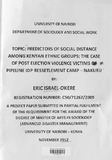| dc.description.abstract | Ethnic violence and inter tribal wars have become a major monster worldwide that has swallowed mans lives from generation to generation. Packaged in different forms like tribalism, ethnicity or racism, it could be a major undertone to most political riots and disputes. It has potential to trigger a lot of economic problems in any nation. The resultant protracted psychological trauma it leaves behind could be the cause of insurgencies and counter insurgencies and the reason for the great insecurity in the world today, causing nation to invent nuclear weapons of mass destruction to protect their identities and sovereignty in the committee of nations. Hence a study of til is is imperative.
In this research, an aspect was looked into to understand the predictors of social distance among Kenyan ethnic groups: the case study of the victims of post election violence victims of pipeline internally displaced people's resettlement camp in Nakuru - Keny a to start unmasking this monster and inspire other researchers to go into other aspects of de-mystifying this mystery of all ages.
This study attempted to discover the roots causes and impacts political violence with tribalistic undertones has made and suggested solutions especially from victims of the subject of research.
The 2007/2008 violence in Kenya resulted into the loss of the lives of about 1,300 people, displacement of more than 350.000 people, destruction of properties, businesses and national economic revenues like tourism, agriculture, international trade and social activities bringing about high inflation to the nation, posing a great challenge to the attainment of the millennium development goals and vision 2030 of Kenya.
It is therefore imperative to study the violence, identify the root causes and develop sustainable solutions that will stem its re-occurrence after understanding the psychological and socioeconomic trauma that the victims went through.
From the literature reviewed, it is evident that political violence has a global trend. It has been witnessed in a lot of countries, but in Africa. Malawi, Uganda, Sudan, South Africa, Nigeria and Somali are examples of nations that have experienced political violence with tribal undertones loosing a lot of lives, properties and infrastructures. The study discovered some factors that triggered off
IV
Political violence in Kenya, which includes prejudice, stereotypes and discrimination. ["he theory of Edward Azar on protracted conflict of 1990 and the functionalist theory of attitude and attitude change with inter-personal dy namics of space buttressed the point that when conflict stays for too long without being resolved, it may become more and more complex and hydra headed.
The research employed qualitative study as research design, with the target of 180 house hold heads. 10 social workers, 7 youths for focus group discussion. 7 men and 7 women but was able to retrieve 131 questionnaires and 6 from the social workers. On the focus group discussion, the researcher had enough men. women and youth to randomly choose from, having 7 in each group. Data was obtained through questionnaires and focus group discussion. The data was summarized into frequencies, percentages and charts, while data obtained from the focus group discussion were reported in narrative form to strengthen the findings and deductions were made on the predictors of social distance among Kenya ethnic groups based on the findings.
The findings shows that majority of those affected by the post election violence are women and the youth, it also exposes the underlying causes of the violence as unresolved long temi grievances of inequality in resource distribution, land problems and tribalistic stereotypes among other deep revelation. The study further gave some recommendation chief of which is civic education to erase tribal lines and prejudices. | en_US |



